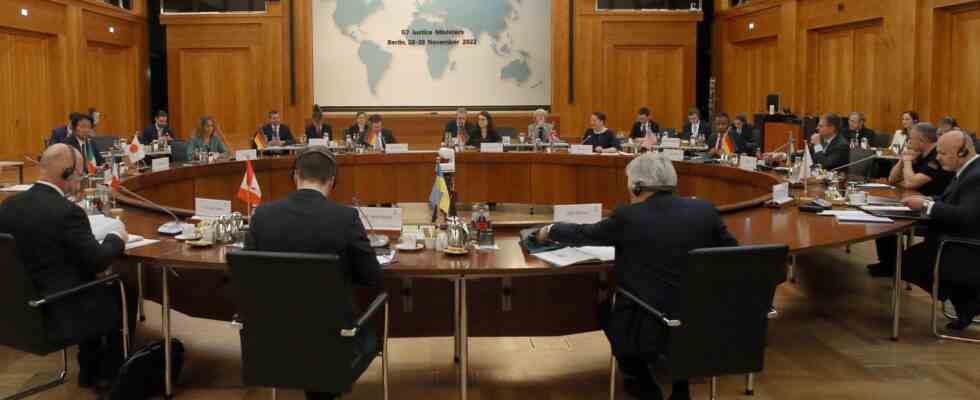Status: 11/29/2022 1:17 p.m
The G7 countries want to network better in the prosecution of war crimes in Ukraine. The main focus is on the exchange of evidence and testimonies. The EU could soon also jointly investigate violations of sanctions.
The investigations into war crimes committed in Ukraine should be better coordinated. At the start of the deliberations of the G7 justice ministers in Berlin, Federal Justice Minister Marco Buschmann said: “We must ensure that these efforts are even better networked.” The FDP politician had also invited a delegation from Ukraine to the consultations.
He said improved cooperation is about preserving evidence and avoiding duplication. Victims who gave testimonies, for example, should not have to testify repeatedly about their traumatizing experiences. The meeting sent out the signal: “War crimes must not go unpunished.” According to Buschmann, the G7 countries must become more efficient.
Kyiv calls for special war crimes tribunal
The Federal Minister of Justice again sharply condemned Russia’s actions in Ukraine. The tactic of exposing people without heating and electricity to a winter when it can get as cold as minus 30 degrees is “criminal,” he said. So far, a total of 45,000 possible war crimes have been registered, and 200 suspects have been investigated.
The government in Kyiv advocates a special tribunal to prosecute Russian crimes in Ukraine. Ukraine wants such a tribunal to deal with the international crime of aggression. “We are open to discussing this,” said EU Justice Commissioner Didier Reynders.
Pursue violations of sanctions at EU level
Reynders and Buschmann also see room for improvement in enforcing the sanctions imposed on Russia, which were decided in response to the war of aggression that began in February.
In a guest article that the FDP politician wrote together with the French Minister of Justice Eric Dupond-Moretti for the “Legal Tribune Online”, it says: “As Ministers of Justice in France and Germany, we believe that we are going further than that and sanctions violations are not only punish together, but also prosecute together.” They would therefore advocate that the competence of the European Public Prosecutor’s Office be extended.
So far, 18.9 billion euros have been frozen
The sanctions have so far frozen 18.9 billion euros, said Reynders. However, eight member states accounted for 90 percent of the blocked sum. Among them is Germany with around 2.2 billion euros. The EU Justice Commissioner demanded that the remaining EU countries urgently need to do some follow-up work.
Pressure from Brussels would have already ensured better implementation of sanctions in some EU countries. In Hungary, for example, the Russian assets held recently rose from 3,000 euros to more than 100 million euros. Similar efforts were also registered in Italy and Spain.
Ukraine reconstruction could cost 400 billion euros
With a view to reconstruction in Ukraine, up to 400 billion euros would be needed, according to Reynders. “Russia has to foot at least part of the bill,” he said. This could be achieved either voluntarily – during negotiations at the end of the war – or by coercion. One could confiscate property, for example, provided this is covered by a court decision.
Germany is chairing the group of seven leading industrialized countries (G7) this year. In mid-November, the G7 interior ministers accused Russia of “the most atrocious crimes” and discussed joint prosecution procedures. In addition to Germany, the G7 group also includes France, Great Britain, Italy, Japan, Canada and the USA.

